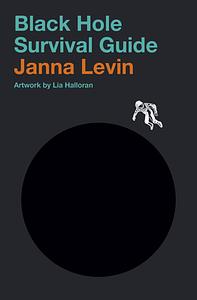You need to sign in or sign up before continuing.
Take a photo of a barcode or cover
Loved it. Will have to re-read soon though. Typical of me and this subject, I hung in there until the quantum mechanics arrived and then.... ouch. This is not the writer’s fault but my own. I think Levin does a stellar job. I just want to sleep on it a bit and then tackle some of the tricky bits again.
This was a very interesting and well explained/written look at black holes. Not sure how much of it I understood mind you!
But I would recommend this, it does an excellent job breaking down a complex topic into digestible chunks.
But I would recommend this, it does an excellent job breaking down a complex topic into digestible chunks.
Not quite the tongue-in-cheek survival guide the title promises, but not a complete miss. Levin presents the physics behind black holes with a thorough, but understandable, narrative, though there are a number of times the metaphors and analogies get carried away and become just a little too confusing.
The premise (how to survive a black hole) is a fun one but Levin kept dropping the ball. A humorous guide would be fun, but this erred too close to serious, scientific writing that would have gone over most casual readers heads.
The premise (how to survive a black hole) is a fun one but Levin kept dropping the ball. A humorous guide would be fun, but this erred too close to serious, scientific writing that would have gone over most casual readers heads.
For those who need a quick and digestible understand of black holes, this is an excellent guide. I loved the metaphors and examples and how they helped me visualize how black holes exist. I also listened to this on audible and the narration was excellent. Can’t wait to read more books by Janna.
This was both a challenging and pleasant read. A lot to wrap the head around, and I had to stop every now and then to reread and ponder what was being said. It's an excellent way to share some pretty complicated astrophysics with more easily accessible analogies.
challenging
informative
reflective
medium-paced
The information Levin presents is fascinating, but I struggled to understand it through the countless metaphors that didn't really seem like they fit that well. There were moments I got excited understanding what Levin said, only to be thrown into the dark again for pages (no pun intended). The complexity of Levin's grammar led to confusion as I tried to parse the antecedents and interjections and what they were actually referring to -- for material like this, I personally need more basic grammar as I'm already confronting concepts I'm unfamiliar with. And at certain points, the book's humor came off too sarcastic for its own good and felt like it undermined the authority of Levin's arguments and explanations.
I noticed a very strange essentialism to some of Levin's metaphors which might not appeal to people attuned to queer gender or sexual practices: calling black holes 'perfect' because they are 'hairless' and using monogamy to refer to entanglement (and going as far as to say particles "can't be polygamous" because of quantum theory, and we must always "restore monogamy"). It just felt weird to rely so heavily on gendered and sexed ideas to convey information. I enjoy consuming science but language like this ties it down with extra baggage and takes my mind off the subject.
I noticed a very strange essentialism to some of Levin's metaphors which might not appeal to people attuned to queer gender or sexual practices: calling black holes 'perfect' because they are 'hairless' and using monogamy to refer to entanglement (and going as far as to say particles "can't be polygamous" because of quantum theory, and we must always "restore monogamy"). It just felt weird to rely so heavily on gendered and sexed ideas to convey information. I enjoy consuming science but language like this ties it down with extra baggage and takes my mind off the subject.
informative
fast-paced
It seems weird to say that I have a favorite theoretical astrophysicist, but I do. I first encountered Janna Levin’s writing in 2003. We had traveled down to Orlando to take our son to Disney World with my Father-in-law and his family. On the road trip back up to Connecticut, we stopped at the NASA base for a couple of hours. It was in their giftshop that I found How the Universe Got Its Spots, and I bought it off the strength of its cover and the first couple of paragraphs. The publisher had only recently published the paperback version, so the giftshop was packed with the book.
I love physics and theoretical physics and cosmology, but I am no longer adept at any of the math that goes with them, nor do I any longer have any interest in the math. That’s where Levin becomes such an excellent guide for me. She writes beautifully and has a talent for communicating the ideas and issues of the field without needing to tangle us up with the mathematics undergirding the science. You get all of the wonder, and all of the reason, without any of pain, a garden of delights without the weeds. I’m thankful for all the scientists who have wrestled with the math to make all this knowledge and speculation possible, but I’m find leaving that stuff to them.
The Black Hole Survival Guide did not disappoint me. It is set up as a small field guide, as though you are planning a trip into a black hole. Levin uses the conceit to talk about what a black hole is, what the properties of the black hole are, how time travels when near them, and the competing theories surrounding them. It is funny and moving and rich. Not surprisingly, her writing has only improved with time; she is at the heights of her powers in this small book. With concepts this dense and grandiose, it is lovely to have the music of her language to coat them and make them graspable and digestible.
The ending discussion of the decades-long fight between relativists and quantum theorists was all new to me, and of course it blew my mind. I had not heard of the theory that our universe is a 3-D hologram of a 2-D space. I’ll be sitting with that for a while (and finding a few informative videos on Youtube to expand on the ideas I first encountered here).
If you love what science thinks and know without wanting to deal with the numbers and formulas, if you prefer the literary to the hard math, then Levin is the guide for you. I’ll be returning to this book, I am sure, in a couple of months to take the journey again and see what new things I discover that passed me by in the first read.
I love physics and theoretical physics and cosmology, but I am no longer adept at any of the math that goes with them, nor do I any longer have any interest in the math. That’s where Levin becomes such an excellent guide for me. She writes beautifully and has a talent for communicating the ideas and issues of the field without needing to tangle us up with the mathematics undergirding the science. You get all of the wonder, and all of the reason, without any of pain, a garden of delights without the weeds. I’m thankful for all the scientists who have wrestled with the math to make all this knowledge and speculation possible, but I’m find leaving that stuff to them.
The Black Hole Survival Guide did not disappoint me. It is set up as a small field guide, as though you are planning a trip into a black hole. Levin uses the conceit to talk about what a black hole is, what the properties of the black hole are, how time travels when near them, and the competing theories surrounding them. It is funny and moving and rich. Not surprisingly, her writing has only improved with time; she is at the heights of her powers in this small book. With concepts this dense and grandiose, it is lovely to have the music of her language to coat them and make them graspable and digestible.
The ending discussion of the decades-long fight between relativists and quantum theorists was all new to me, and of course it blew my mind. I had not heard of the theory that our universe is a 3-D hologram of a 2-D space. I’ll be sitting with that for a while (and finding a few informative videos on Youtube to expand on the ideas I first encountered here).
If you love what science thinks and know without wanting to deal with the numbers and formulas, if you prefer the literary to the hard math, then Levin is the guide for you. I’ll be returning to this book, I am sure, in a couple of months to take the journey again and see what new things I discover that passed me by in the first read.







